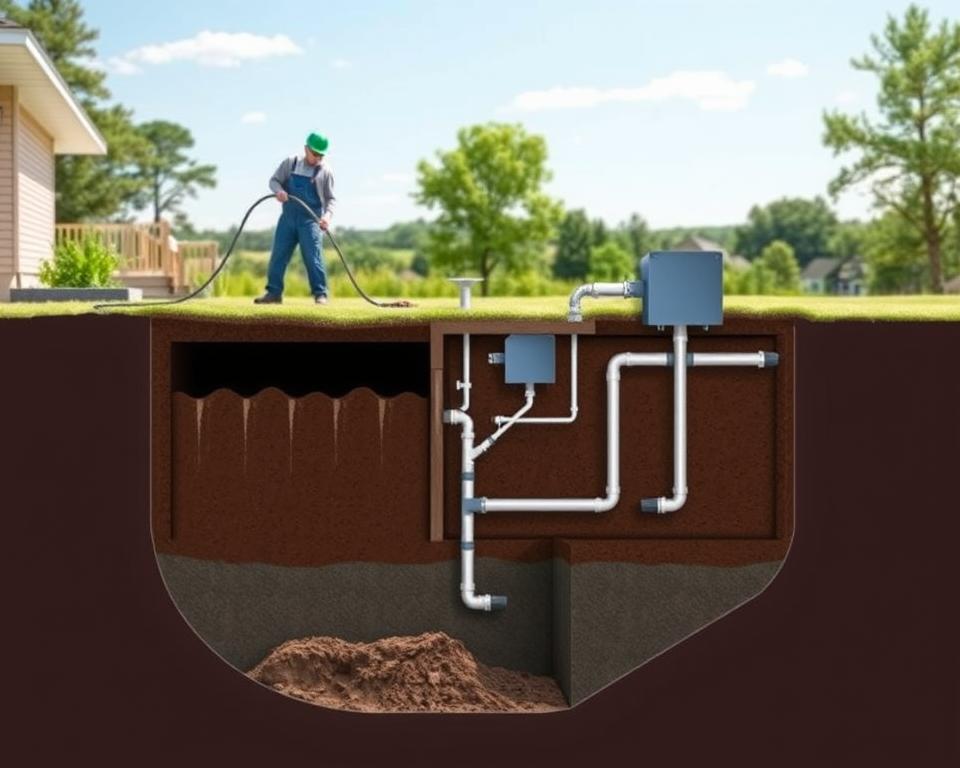Septic Tank Pump Swap: The Essential Guide
Ever wondered about the aftermath of a Septic Tank Pump failure? For many, it’s a scenario that creates considerable anxiety and sudden outlays. Recognizing the call for immediate replacement is crucial in keeping a smooth and sanitary Septic system. By committing to regular check-ups, including prompt repair needs, you prolong your system’s life while skipping costly emergencies. Companies like All in Sanitation play a pivotal role in helping keep your Septic tank working efficiently. This guide offers a comprehensive insight of Septic Tank Pump replacement, including alert signals and service pointers for septic system cleaning.
Summary Highlights
- Understanding the function of a Septic Tank Pump is crucial for homeowners.
- On-time Septic Tank Pump replacement can reduce long-term expenses.
- Regular care and cleaning are central to prolonging the lifespan of your Septic system.
- Professional assistance can successfully tackle Septic system Pump repair and maintenance.
- Detecting first indicators of Pump failure can sidestep costly repairs.
Knowing Your Septic System
A Septic system is crucial for homes without access to town sewer networks. It manages household wastewater safely. The Septic tank is core to this system’s performance, serving an important role in the process.
The Septic tank accepts sewage, separating solids from lighter materials. This segregation is critical for effective wastewater treatment. The processed water then enters the drain field, where it receives further cleansing by the soil, shielding groundwater.
Grasping how your Septic system runs can extend its life and efficiency. Regular upkeep is vital for the Septic tank and the system’s overall well-being. Homeowners must learn about their system’s particulars to protect the environment and avoid pricey renovation.
Septic Tank Basics
A Septic tank is a in-ground, sealed container integral to household waste management systems. It’s vital to grasp the Septic tank’s main role: it processes sewage waste storage by processing it. This setup works by sorting solids from liquids, supporting basic wastewater treatment and sanitation.
Its operation depends on naturally occurring microorganisms that break down waste. In locales without centralized sewage treatment, Septic tanks are necessary. They retain sewage long enough for solids to descend, forming sludge. Meanwhile, liquid effluent rises to the top, allowing filtration in the drainage field.
Keeping a Septic tank in optimal state is vital for its efficiency and service life. Routine care is necessary to preventing issues like backups and overflows. These issues can lead to expensive repairs and pose ecological threats. In essence, Septic tanks play a significant role in ensuring hygiene and safety, especially in rural areas.

Indicators You Need a New Pump
Homeowners should be conscious of signs that their Septic tank may need a new Pump. A clear sign is experiencing foul odors around drains or in the yard, indicating a system failure. Experiencing recurring or severe sewage backups in your home needs urgent action to avoid worse issues.
Experiencing slow draining drains signals a potential problem. Household fixtures that empty slowly might mean a Pump failure or a clog calling for an expert’s evaluation. Additionally, patches of overly lush vegetation in your yard could signal trouble; this suggests waste leakage, resulting in overflow concerns.
To prevent serious, high-cost restoration, homeowners should handle these signs swiftly. Conducting consistent inspections and maintenance is key for the Septic system’s top function.
| Signs | Description |
|---|---|
| Foul Odors | Unpleasant smells around drains or yard pointing to system failure. |
| Sewage Backup | Recurring overflows in sinks or toilets indicating potential Pump issues. |
| Slow Draining Drains | Fixtures draining slowly can mean blockages or Pump malfunction. |
| Lush Vegetation | Areas of overgrowth near the tank suggesting possible overflow. |
Pump Replacement Frequency
Knowing the interval for replacing your Septic Pump is crucial for a smooth-running Septic system. It’s recommended to have your system assessed every three years. A certified technician during these reviews provides information into how well your system operates.
Generally, service of the Septic tank becomes required every five years. However, households with extensive use or a big family might need more frequent servicing. Proper care of your Septic system wards off costly repairs and increases its lifespan. Specialists in Septic services can design a maintenance plan that matches your usage and the details of your system.
Being proactive with Septic Pump replacements maintains your system’s peak performance and guards your home investment. Periodic evaluations and service dodge unforeseen costs. They ensure trouble-free performance.
Cost of Septic Tank Pump Replacement
The Septic Pump replacement cost changes, affected by many variables. Homeowners should expect costs of $500 to $1,300 for a new Pump. This price range covers differences in the kind of Pump and material needs. It’s necessary to include the Pump and Septic tank servicing costs for the fitting and mandatory inspections.
Costs can also climb due to problems within the Septic system or local wage levels. Needed fixes, triggered by wear or harm, could boost the total outlay. In reviewing financial estimates for Septic services, consider charges for regular upkeep, assessments, and any unforeseen emergencies since these factors strongly support maintaining your system’s longevity.
Allocating funds for consistent Septic service reduces the impact of sudden charges. Proactive budgeting aids homeowners in dealing with expenses linked to the Pump’s replacement and system upkeep.
How Pump Replacement Works
The Septic Tank Pump replacement begins with a detailed inspection of the system. This opening check finds any additional issues beyond the Pump itself. The faulty Pump is then taken out cautiously and efficiently.
Installing the new Pump entails careful attention to connection security, making sure no leaks. Qualified technicians ensure the installation is accurately completed, minimizing future issues.
The closing stage is a complete final inspection. It ensures proper functioning, granting homeowners confidence. With qualified aid, the process is smooth, creating minimal hassle.
Best Practices for Installation
When performing Septic Pump installation, it’s essential to observe best practices. Bringing in skilled professionals ensures compliance with local regulations. They competently oversee the installation details, sidestepping errors common in inexperienced setups.
Keeping to stringent Septic service standards is important for smooth system flow. Opting for correct components and durable materials increases the Pump’s life and optimizes the Septic system’s efficiency. This precise approach improves maintenance and overall performance longevity.
- Go with a reputable service provider who specializes in Septic systems.
- Verify that all necessary permits and inspections are in place before work kicks off.
- Use Pumps that fit the specific requirements of your Septic system.
- Schedule a pre-installation inspection to evaluate site conditions.
- Consider the layout and flow of the Septic system during installation.
Following these guidelines creates a trouble-free install. It also delivers a reliable system for efficient waste handling.
Caring for Your Septic System
Heading off pricey troubles with your Septic system starts with routine care. By observing simple guidelines, homeowners can preserve their Septic systems’ efficiency. Setting up periodic reviews is a good idea. It detects and address problems before they become serious.
It’s also important to avoid flushing dangerous items down the drain. Oily residue, chemicals, and items that don’t break down can impair your system. Lowering water use during busy periods can also ease system load.
Scheduling expert services with entities like All in Sanitation is vital for Septic health. Knowing what you can and cannot do with your Septic tank can greatly extend its lifespan and protect your household environment.
Cleaning Your Septic Tank
Routine Septic tank cleaning is vital for your system’s long-term function and efficiency. The process comprises clearing sludge, examining for faults, and verifying everything runs smoothly. These steps are critical to ensure continuous performance and ward off pricey problems.
A thorough Septic maintenance plan should include routine reviews and cleanings that align with your specific usage. Homeowners must understand the importance of prompt care to avoid problems like backups. Hiring experts makes sure the cleaning is thorough, promoting a safe household.
| Service Type | Frequency | Benefits |
|---|---|---|
| Pumping | Every 3-5 years | Avoids system failure and backups |
| Inspection | Annually | Identifies potential issues early |
| Maintenance | As needed | Lengthens the lifespan of the system |
Committing to consistent Septic tank cleaning lowers spending and prolongs your system’s life. It ensures smooth waste processing. Starting today ensures your Septic system’s efficiency for the future.
Selecting the Right Service
Selecting a reputable Septic service provider is vital when replacing a Septic Tank Pump. First, confirming their certifications and licenses. Such credentials confirm the company’s compliance with industry norms, vital for a smooth replacement process.
Examining customer reviews is also a critical step. Past feedback reflects service quality, aiding in the filtering process. Go with companies with a solid track record of high standards and customer support.
Listen to recommendations from your social circle too. Insights from friends and neighbors can highlight top-notch Septic services in your vicinity. Always ask for detailed stories of their good results with these services.
Finally, review the range of services and cost from various firms. A detailed analysis provides exceptional service and improves the value of your expenditure. Keeping to these guidelines ensures your Septic system receives the quality care it deserves.
DIY or Hire a Pro?
Homeowners often wonder whether to handle Septic issues personally or call in experts. DIY Septic maintenance appears attractive for minor fixes and upkeep. For example, checking tank levels or snaking lines can be done solo.
However, recognizing when to hire Septic professionals is essential for major faults. Heavy-duty repairs, replacing systems, or big blockages need unique tools and knowledge. Without the right skills, attempts to resolve these problems can create ecological hazards and extensive damage.
Determining between DIY and professional help demands judging the job’s complexity. Presented below are examples highlighting when DIY is acceptable and when professional Septic services are essential:
| Situation | DIY Feasibility | Need for Professional Help |
|---|---|---|
| Routine maintenance (e.g., tank level checks) | Yes | No |
| Minor clogs in drain fields | Yes | No |
| Major Septic Tank Pump failure | No | Yes |
| Complex sewage backflow issues | No | Yes |
| Regular system inspections | Possible DIY | Yes for thorough checks |
Choosing wisely on these matters ensures safety and efficiency. Opting properly not only protects the Septic system but also prevents unplanned bills.
The Final Word
Knowing the workings of your Septic system is important for its efficient oversight and your home’s well-being. Recognizing initial signals of issues helps avoid high repair bills and maintains the system’s integrity. This proactive approach helps the environment and enhances your property value.
To keep your Septic system in optimal condition, emphasize maintenance. This includes consistent assessments and on-time professional Pumping. This modest investment maintains your home’s safety and your wellbeing. Your Septic system thrives with proper care.
Our team at All in Sanitation is dedicated to offering top-notch Septic care. We supply the experience necessary to maintain your system operating efficiently, securing your home investment over time. With our dedication to outstanding care and steadfastness, we’re here for your Septic maintenance needs.


